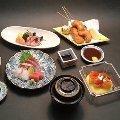Different foods, cooking techniques and lifestyles can explain why some people of some cultures are leaner, healthier and living longer than others. Dietitians and health experts say it's important to learn from the world's healthiest countries, if we want to lose weight, fight disease and enjoy a healthier life. Healthiest Top 10 After years of traveling the globe, fitness expert Harley Pasternak has learned a lot about the diets and lifestyles of the world's healthiest countries. In his new book, "The 5-Factor World Diet", he ranks the world's top 10 healthiest nations. "The Japanese, in my opinion, are the healthiest population in the world," says Pasternak. "They have the longest lifespan in the world, the lowest incidence of obesity, heart disease and diabetes." What and how the Japanese eat, he says, explains why they are the healthiest people on earth.
"Every meal in Japan looks like a piece of art. Food is so beautiful and so delicious and so simple," says Pasternak. "They are the largest consumer of fish in the world and of whole soy and of seaweed and green tea. When they are about 80 percent full, they stop and wait for about 10 minutes, then decide whether to keep going. And most times, they are full so they don't need to keep eating more." Three other Asian countries make Pasternak's top ten: Singapore, Korea and China. The list is rounded out by Israel, Sweden, France and two countries on the Mediterranean; Greece and Italy.
Mediterranean diet "Italian food is extremely healthy from lentils and garbanzo beans to balsamic vinegars, small portions of homemade pastas," he explains. "They eat their largest meal of the day as lunch, not dinner. They have a big feast on Sundays. It's not a daily thing. They have something called passeggiata, so after every dinner they get up as a family and they go for a walk." That Mediterranean diet is what cardiologist Richard Collins says he always recommends to his clients.
"The Mediterranean diet is very rich in vegetables and fruits and whole grains, lean meats and poultry, a lot of Omega 3 rich fish," says Collins. "And if you look at the lifestyle and eating style, they balance their physical activity with their calorie intake." Collins is known as the Cooking Cardiologist. He says combining medical and culinary expertise allows him to help people recognize the cooking mistakes that make their diet unhealthy.
"I think the first mistake is they start with unhealthy ingredients," he says. "They are not looking at the natural aspect of food. Number two, in looking at the cooking techniques, I've noticed we're tough on our food. We beat it up. We want it hot, we want it now, we want it deep fried, we want it blackened, we want it burnt. If you look at the European style of cooking, [it's] much more genteel: poaching, steaming, taking your time. We've got to realize that, because what happens when we're doing this to our food, we destroy essential vitamins." Even small changes in what we eat and how we prepare our food can be very useful, says physician David Servan-Schreiber, author of "Anti-Cancer, A New Way of Life". "A recent study in China found that women who eat mushrooms three times a week have a 50 percent reduction in the risk of developing breast cancer. If they drink three cups of green tea, three times a week, they also have a 50 percent reduction in the risk of developing breast cancer," says Servan-Schreiber. "If they do both, they have an 89 percent reduction in the risk of developing breast cancer. So these are stunning numbers for something as simple as eating mushrooms and drinking green tea." Spice of Life Servan-Schreiber says people in countries that use lots of spices also experience better health. "Like turmeric, which is used in India very much, but also along with North African Countries. And everywhere where people use these spices and herbs - like thyme, rosemary, oregano, basil, mint and so on - the cancer rates are much lower, and when they have cancer, it's not as aggressive." Physician Kelly Traver, author of "The Program: The Brain-Smart Approach to the Healthiest You", agrees. She says knowledge about the world's healthiest diets has become more available than ever and can help us fight our worst enemy: obesity. "What we've now learned is that fat is not just a deposit for energy in our bodies," says Traver. "Actually, each fat cell secretes at least 100 chemicals out of the cell into our bodies, which promote cancer, which promote aging, which promote inflammatory chemicals that can influence dementia, arthritis and heart disease. So, actually fat holds a bigger key in health, clearly, than [just being a] cosmetic issue." Dietitians and health experts say understanding how important our food choices are, and learning a lesson or two from the world's healthiest nations, can help us live healthier, too.

